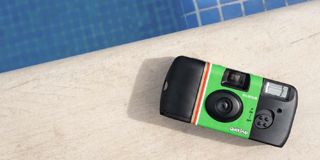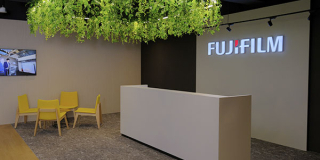The history of Fujifilm’s lens manufacturing started in 1940 when it succeeded in the manufacturing of 12 kinds of optical elements. At the start of color broadcasting in the 1960s, lenses for television were developed from our expertise in optical instruments, such as cameras, lenses, and binoculars, these were offered under the FUJINON brand. FUJINON has burnished its reputation for high performance and high quality through its dedication to advanced lens design technology, polishing, assembly, and inspection. FUJINON Lenses have won the Technology & Engineering Emmy Award several times, which is one of the most prestigious awards in the broadcasting industry along with the Academy Award.
Utilizing its technological capabilities, Fujifilm develops and supplies a wide range of sizes, materials and shapes from large to super small aperture lenses, such as lenses for 8K and 4K high-definition broadcasting, interchangeable lenses for digital cameras and CINE lenses that are beloved by professional creators all over the world. In addition, major product lines are also endoscopes and machine vision lenses for product inspection in manufacturing. We contribute to creating high-resolution images in our unique position as a comprehensive lens manufacturer.
With sales and production bases in more than 30 countries worldwide, Fujifilm provides quick and carefully tailored local services at each location.
We work to manufacture products that address the needs of the customers and the market while always striving to be both advanced and unique, such as by developing and releasing projectors featuring the world’s first*1 folded two-axial rotatable lens, and security lenses with world-leading*2 anti-vibration performance. We will continue to grow in tandem with users, and strive to meet their many different requirements.
- *1 As of February 13, 2019, according to Fujifilm data
- *2 As remote surveillance cameras with lens’ focal ranges over 350 mm. As of October 22, 2018, according to Fujifilm data
![[photo] FUJINON Broadcast lens stacked on top of other lens in front of black background](https://asset.fujifilm.com/www/my/files/2020-01/5856547a4892e65d76f96805e6b63a81/pic_tellthestory_01.jpg)
Large aperture lenses for broadcasting are symbolic of our exceptional optical technology.Fujifilm is also proud to apply its outstanding optical technology to support the development and manufacturing of 8K lenses, which are significantly more complex than 4K lenses.
We have developed zoom lenses for cinema production that reproduce incredible images by bringing together the optical technologies accumulated in the development of lenses for many applications. The exceptional images are realized from wide angle to full telephoto.
![[photo] Cine lenses standing upright and lined up in a row, with another row of lenses angled on side in front](https://asset.fujifilm.com/www/my/files/2020-01/0623186a8635e1f4c2c099e364b55cce/pic_tellthestory_02-1.jpg)
![[photo] FUJINON Projector system with projector lens swiveled up](https://asset.fujifilm.com/www/my/files/2020-01/98879eb61a129a15f34accd3ea0549c5/pic_tellthestory_03.jpg)
Fujifilm unites together all of the optical technologies of the cutting-edge FUJINON lenses, featuring the world’s first*3 folded two-axial rotatable lens. We expand the possibilities of spatial presentation to address varied demands, such as “I’d like to be able to project this within a limited space,” or “I want to make the most of this space by also using the ceiling and floor.”
- *3 As of February 13, 2019, according to Fujifilm data
We contribute to high-precision surveillance by realizing the increasing demand recently for a safer and more secure society by bringing together the optical technology we have accumulated over many years. Our cutting-edge image-processing technology has been used to develop the FUJIFILM SX800—a remote monitoring camera with an integrated high-performance FUJINON lens, offering a focal range from 20 mm to 800 mm.

![[photo] All of FUJIFILM Machine Vision lenses standing upright in large group](https://asset.fujifilm.com/www/my/files/2020-01/ece52473f19428441a9b60830534d5e6/pic_tellthestory_05.jpg)
Manufactured products are analyzed visually using machine vision systems at manufacturing sites and further improvement in terms of automation and laborsaving on production lines is also expected in the future. With the ever-growing need for high-precision inspection and measurement devices, Fujifilm addresses diverse customer requirements with an extensive lineup of machine vision lenses that afford excellent performance, high definition and exceptional quality.
Ever since the release of the first model in 1947, FUJINON binoculars have built up a loyal following thanks to their superb optical performance. They have been popular with professional users, especially those working in tough environments—such as on heaving seas, or astronomers seeking to observe streaking comets—thanks to their exceptional optical performance, reliability, robust design, and ease of operation. FUJINON binoculars afford the viewer untold pleasure as they capture sights that would be otherwise unseen in bright and crisp focus.
![[photo] Hands holding FUJINON Binoculars with dark green lenses](https://asset.fujifilm.com/www/my/files/2020-01/9a778e2b7cd9378ed9673d7712b48b44/pic_tellthestory_06.jpg)









